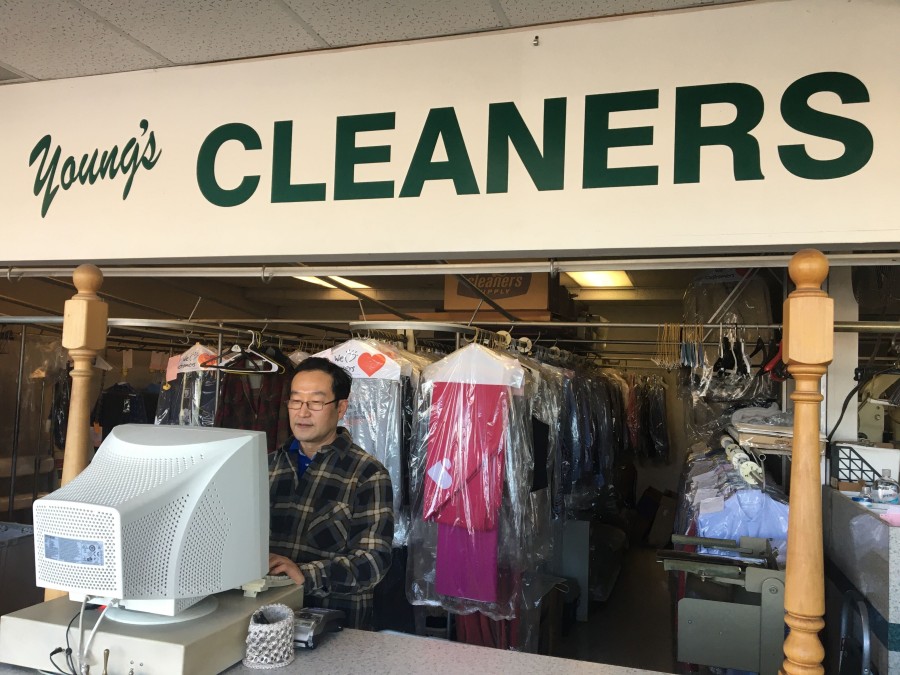Your Friendly Neighborhood Dry Cleaner May Be Another Casualty Of The Pandemic
By Odette Yousef

Your Friendly Neighborhood Dry Cleaner May Be Another Casualty Of The Pandemic
By Odette YousefWhen Charles Kwon’s parents bought a dry-cleaning operation in 1989, business was booming: Loyal customers regularly hauled in armloads of two-piece suits, dress shirts and all manner of women’s work attire. In the years since, Kwon relocated from Downers Grove to a better location off Route 59 in Naperville. But right now, he’s one of the many dry-cleaning operators across Illinois — and probably the nation — hanging on by a thread.
On a recent afternoon, the 55-year-old business owner was grateful to see a lone regular bring in 15 shirts to be laundered and pressed. “He’s coming … about once a month,” Kwon noted with a rueful laugh.
Also the executive director of the Illinois Korean-American Drycleaners Association, Kwon has been watching the industry shrink gradually since its peak around 1999, when he counted 1,900 members, compared to just 360 today. According to the Illinois Environmental Protection Agency, which oversees dry-cleaning operators in this state, 611 facilities are licensed to operate in 2021. Despite the industry’s decline over the years, Kwon did not expect to see business fall off a cliff as abruptly as it did when Illinois’ first stay-at-home order took effect last March. Immediately after, traffic to his own store fell by 90%, Kwon estimates.
Among the many certainties of life upended by the pandemic, the neighborhood dry cleaner may be yet another. A familiar urban staple, these mom-and-pop operations have suffered acutely as office workers transitioned to sweats and yoga pants at home, and industry watchers worry that the shift may become permanent. Here in Illinois, Korean Americans, who own most of the state’s cleaning facilities, are bearing the brunt of the downturn.
Deemed “essential businesses,” many dry cleaners stayed open during the past year to pull in whatever revenue they could. Some tapped into a new category of public assistance that became available to the self-employed, called Pandemic Unemployment Assistance. Kwon said he receives $148 per week through that program. The small sum helps defray the cost of rent and utilities.
But for many of these dry cleaners, other forms of federal assistance available during the pandemic has not made business sense. Although the second round of federal Paycheck Protection Program loans is starting to trickle down to smaller operations that may not have benefited from the program last fall, Heidi Park, of the National Drycleaners Institute, said PPP loans seem risky to many operators, who fear that if business does not rebound they’ll be unable to pay off the debt.
Park said that her organization has seen an uptick in requests for help in the past 10 months; the organization, a nonprofit based in Algonquin, provides consulting services to help dry-cleaning owners comply with government regulations and grow their business. Park said she has recently helped numerous dry cleaners notify state regulators that they’ll be closing or downshifting from on-site cleaning to simply receiving laundry as a drop-off station.
Park said she is also fielding an array of questions from operators who are fighting to stay afloat. “Anywhere from ‘How do I reduce my rent?’ [to] ‘Can you help me apply for loans?’ ” she said, in addition to requests for help with new marketing tactics or lowering phone bills and credit card payments.
“Some people have refinanced their home. Some people have actually sold their home and moved in with family members to save on mortgage,” Park said. “It’s sad.”
These off-the-books personal sacrifices make it difficult to measure exactly how much wealth has disappeared from the Korean American community in Illinois with the sharp contraction of the dry-cleaning industry. But Park said the impact is felt most among her parents’ generation: Korean immigrants now in their 60s, who came to the U.S. 30 years ago and became entrepreneurs. At the time, running a dry cleaning business was enough to provide for a family, send children to college and save for retirement. But not anymore, many feel.
For those who have taken on loans, a sense of dread has come along with them. Tae Jung, 62, owns Fox Valley Cleaners in St. Charles. Before the pandemic hit, he had planned to sell his business and retire within two years. But once the statewide shutdown took effect, he applied for a PPP loan and received $5,000, which was only enough to cover one month’s rent. Jung also borrowed $130,000 from the Small Business Administration. Jung does not know how he’ll pay back the loan over the next 30 years, but one thing is certain — his plans to retire have fallen apart.
Kwon, the Naperville dry cleaner, said in his more than 30 years working in the industry, he has only taken one vacation — for his honeymoon, many decades ago. He said that he doesn’t advise his three children to follow in his footsteps.
“Usually I tell them, do what you like to do,” he said. “Even though [it may earn] less money, do what you want to do.”
Odette Yousef is a reporter on WBEZ’s Race, Class and Communities team. Follow her @oyousef.
This story is a part of the Solving for Chicago collaborative effort by newsrooms to cover the workers deemed “essential” during COVID-19 and how the pandemic is reshaping work and employment.

It is a project of the Local Media Foundation with support from the Google News Initiative and the Solutions Journalism Network. The 19 partners span print, digital and broadcasting and include WBEZ, WTTW, the Chicago Reader, the Chicago Defender, La Raza, Shaw Media, Block Club Chicago, Borderless Magazine, the South Side Weekly, Injustice Watch, Austin Weekly News, Wednesday Journal, Forest Park Review, Riverside Brookfield Landmark, Windy City Times, the Hyde Park Herald, Inside Publications, Loop North News and Chicago Music Guide.